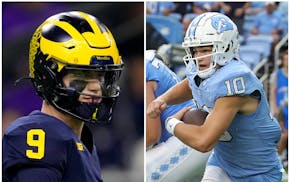Vikings players receive their weekly game plan when they return to work every Wednesday. Apparently, offensive coordinator Bill Musgrave also gave them a message along with his plan for the San Francisco 49ers last week.
"Coach Musgrave told us at the beginning of the week that he thought he had plan to beat them," Percy Harvin said. "He wasn't just saying that to say it. All week each [position] coach came up and gave us an example of why they felt we should beat this team and how we matched up with them."
Whether that was merely a motivational ploy or steadfast belief in the scheme -- or combination of both -- their words resonated inside the locker room. Unprompted, several players credited the game plan and their execution of it against one of the NFL's toughest defenses in a 24-13 victory.
"Coach Musgrave came up with a brilliant game plan," quarterback Christian Ponder said, "and all we had to do was execute."
A successful performance typically requires a marriage of those two things, especially execution. Even the best game plans aren't worth the paper they're printed on if players don't react accordingly and handle their individual assignments. On Sunday, the Vikings had faith in their approach and then applied it on the field.
"There was just something about this week in particular that we just felt good about how we were going to attack them," left guard Charlie Johnson said. "We knew going into the game that they are a great defense. But we felt if we executed our plan that we would have success."
Analyzing game plans is ingrained in the football culture. Like second-guessing a baseball manager, it's just part of the weekly routine for fans and media. It drives us crazy when a coach becomes too conservative and doesn't expose a perceived weakness. We have impassioned beliefs on whether a team should run more, pass more, blitz less, play more man-to-man coverage or utilize a certain player in a different role.
Musgrave certainly has heard his share of criticism in his one-plus seasons with the Vikings, and he has left me scratching my head on more than one occasion, specifically over how he used Harvin last season. Sunday was not one of the days, however.
Musgrave employed a balanced, aggressive approach to keep his offense from becoming too predictable. He set the tone on the opening drive, which spanned 16 plays and ended one a 1-yard touchdown pass from Ponder to tight end Kyle Rudolph.
The Vikings used eight runs and eight passes in their longest scoring drive since 2006. They began with this sequence of play calls: run, pass, run, pass, run, pass, run, pass, run, pass.
Musgrave called eight running plays for Adrian Peterson, four passes to Rudolph and two screens to Harvin on the drive.
"Everyone was involved -- tight ends, receivers, and the quarterback," Peterson said.
Maybe they found a formula that works in the process. Pound the ball with Peterson, get Rudolph involved early, keep Harvin on the edges and in space and allow Ponder to use his athleticism on bootlegs. That first drive provided a snapshot of how their offense can function, although Jerome Simpson's return also should add a vertical component now.
"We sure hope so," Harvin said of the potential blueprint. "We feel like if we're hitting on all cylinders, we can play with anybody in this league."
It's incumbent on coaches to give them the latitude and direction to achieve that. Center John Sullivan credited the staff's willingness to accept input from players during the week on what they felt would work best in the game.
"I think our input really does matter with our coaches, and I respect that about them," Sullivan said. "They understand how this relationship works. We do what we're coached to do. But we have veteran players and we get a good feel for what we think is going to work and what won't [and] what we think is not quite as good against a certain defense. We work in conjunction with each other."
That process starts anew Wednesday when the players return to work.
"Our coaches are always going to try and give them the best game plan possible," Leslie Frazier said, "but there are going to be things that happen during the course of the game that aren't going to be just like you thought they would be. You have to adjust as the game goes on. You'd love to have the perfect game plan every week, but sometimes it's about me being able to line up and whoop the guy in front of me."
Chip Scoggins ascoggins@startribune.com
Scoggins: 'Wait one more year' can't be the Wild's plan. Thankfully, it isn't.

Scoggins: Finch feeling heat of the Suns as playoff battle looms
Scoggins: Why 'championship or bust' fits these Wolves

Scoggins: Anatomy of a game-saving play as Correa throws out Ohtani


